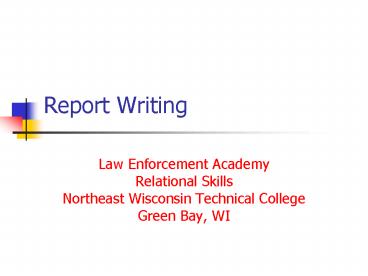Report Writing - PowerPoint PPT Presentation
1 / 20
Title:
Report Writing
Description:
Report Writing in Modern Law Enforcement Patrol officers estimate that up to 50% of their duty time is spent writing reports. ... Police Report Writing Author: Sharon ... – PowerPoint PPT presentation
Number of Views:9647
Avg rating:3.0/5.0
Title: Report Writing
1
Report Writing
- Law Enforcement Academy
- Relational Skills
- Northeast Wisconsin Technical College
- Green Bay, WI
2
Report Writing in Modern Law Enforcement
- Patrol officers estimate that up to 50 of their
duty time is spent writing reports. - Detectives estimate that up to 75 of their duty
time is spent writing reports. - Report Writing for Criminal Justice
Professionals,1998, p. 3.
3
Why Write Reports?
- Operational and administrative reports serve many
purposes. - Operational reports
- Document actions of officers and individuals in
incidents. - Give pertinent facts of the incident.
- Help prosecutors decide what the offense is and
what to charge an individual with. - Point out similarities of current and prior
incidents.
4
Operational Reports
- Operational Reports (Continued)
- Help an officer recall the details of a case for
follow-up or for testimony later. - Protect officers from civil suits.
- Keep track of actions taken on a case and
coordinate efforts of investigators and agencies
involved. - Show trends of crimes or criminal activity in
certain areas. - Present data that is used to write Administrative
reports.
5
Administrative Reports
- Administrative Reports
- Determine what administrative action or follow-up
is needed. - Send information to other agencies.
- Current FBIs Uniform Crime Report (UCR)
- Proposed National Incident-Based Reporting
System (NIBRIS) - Coordinate community policing efforts.
6
Administrative Reports
- Administrative Reports (Continued)
- Consolidate information for governmental
officials. - Determine budgetary needs.
- Determine training needs and officer assignments.
- Assess officer performance.
- Determine officer transfer or promotion.
7
Who Reads Reports?
- Supervisors and higher ranking officers
- Fellow officers/ Other agency officers
- Judges, Attorneys, Officers of the Court
- Governmental officials (Governors, County
Supervisors, Mayors, Commissioners) - Members of the general public
- Insurance company personnel
- News and media personnel
8
A Good Police Report
- A good police report is a clear, concise,
accurate, well-organized narrative of the facts
of an incident.
9
Notebooks
- Good reports start with good notes.
- Officers should keep notes of incidents in a
bound or loose-leaf notebook. - Bound notebooks
- Bound pages offer unchanged continuity.
- Bound pages are less likely to fall out.
- Cost is minimal .
- A 3 x 5 format is easy to carry.
- If notes are taken to court, the whole book must
be submitted.
10
Notebooks
- Loose-leaf notebook
- Rings and a hard cover are durable.
- Hard cover offers a sturdy writing surface.
- Cost of additional pages is low.
- Pages may be numbered consecutively and only
portions submitted to court. - Opens an officer to accusations of tampering
since pages may be easily removed or accidentally
lost.
11
Notebook Format
- On the inside cover, write your name, rank, ID
number, book number, name of your agency,
address, and a phone number in case your notebook
is lost and recovered. Cover this information
with clear tape to protect it against smudges or
moisture. - Use black ink to record all information
- Number the pages consecutively
12
Incident Format
- For each incident, note the case number, date,
time, and location. Include the details of the
incident, including the who, what, when, where,
how, and why, if known.
Case Number Date Location Call Out
Time
13
Incident Details
- Who names, addresses, phone numbers, DOB,
gender, ethnic origin, relationship to the crime
(victim, witness, suspect), statements, actions
taken.
- What describe the incident as you experienced it
or as it was told to you by those involved. - When note dates and times.
14
Incident Details
- Where note the location of the alleged incident.
- How relate what victims or witnesses tell you
they experienced or describe what you saw.
- Why relate statements of others, but do not
write your own opinions. Many times the why of
an incident is unknown.
15
Incident Notes
- Never use notebooks for personal information
(like phone numbers or addresses) or security
information (like informants names/ numbers). - When you question whether to record something,
put it in your notes. Many irrelevant details
have been key to identifying a suspect or to
solving a case. - Write only on one side of the paper. (If you have
to submit notes to court, you submit only the
relevant information).
16
Incident Notes
- Use modern terminology and clear, understandable
wording (no legalese or police jargon) - Do not abbreviate words or use a personal form of
shorthand. (Others may have to read your notes.) - Add sketches or diagrams as needed to recall the
scene.
17
Save or Discard Notes?
- After you have written your report, decide if you
will save or discard your notes. - Some departments have policies that you must
follow. - Whatever you choose to do, be consistent with
that decision. - Good reasons exist both to save and to discard
notes.
18
Save the Notes
- You may testify from them later.
- If well-written, they show your competence. (But
if they are poorly- written, they may show your
incompetence!) - You may use them as reference to supplemental
reports.
19
Discard Notes
- If you write information from further
investigations in the report that are not in the
notes, you have an inconsistency. - Destroyed notes cannot be subpoenaed by a defense
attorney. - Everything in your notes is in the report, so
there is no reason to save them.
20
The ABCs of Report Writing
- Accuracy
- Of details
- Of word choice
- Brevity
- Of style
- Simple wording
- First person
- Active voice
- Completeness































